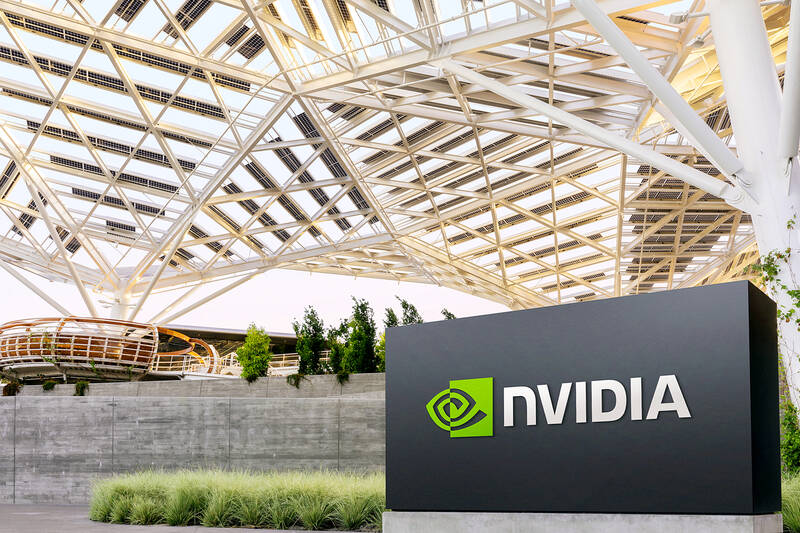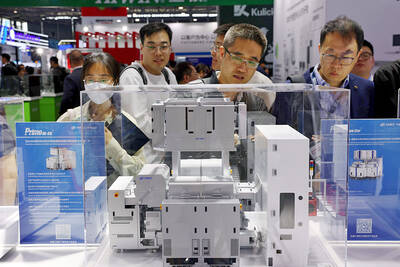Hon Hai Precision Industry Co (鴻海精密) has partnered with US graphics chip designer Nvidia Corp to develop automated and autonomous vehicle platforms.
According to the strategic partnership agreement, iPhone assembler Hon Hai, known as Foxconn Technology Group (富士康科技集團) outside of Taiwan, is to serve as a tier-one manufacturer to produce electronic control units based on the Nvidia Drive Orin platform for the global auto market, Nvidia said in a statement on Tuesday.
Nvidia said Hon Hai-made electric vehicles (EVs) would feature Drive Orin and Drive Hyperion sensors to develop self-driving capabilities.

Photo: Reuters / Courtesy NVidia / Handout
“This strategic cooperation with Nvidia strengthens the intelligent driving solutions Foxconn will be able to provide. Together, we are enabling the industry to build energy-efficient, automated vehicles,” Hon Hai software development center senior director Eric Yeh (葉光釗) said in the statement.
Nvidia said the partnership with Hon Hai would allow it to further scale its efforts and meet growing demand as more transportation firms select Drive Orin for intelligent vehicles, while Hon Hai could accelerate its time-to-market and time-to-cost strategies through its efforts to build EVs using the Drive Hyperion qualified sensor set.
The partnership aims to help Hon Hai provide self-driving solutions based on a “contract design and manufacturing service” business model, Hon Hai said.
The cooperation is also expected to help the company design and manufacture “autonomous driving control units” for EV production, it said.

With this year’s Semicon Taiwan trade show set to kick off on Wednesday, market attention has turned to the mass production of advanced packaging technologies and capacity expansion in Taiwan and the US. With traditional scaling reaching physical limits, heterogeneous integration and packaging technologies have emerged as key solutions. Surging demand for artificial intelligence (AI), high-performance computing (HPC) and high-bandwidth memory (HBM) chips has put technologies such as chip-on-wafer-on-substrate (CoWoS), integrated fan-out (InFO), system on integrated chips (SoIC), 3D IC and fan-out panel-level packaging (FOPLP) at the center of semiconductor innovation, making them a major focus at this year’s trade show, according

DEBUT: The trade show is to feature 17 national pavilions, a new high for the event, including from Canada, Costa Rica, Lithuania, Sweden and Vietnam for the first time The Semicon Taiwan trade show, which opens on Wednesday, is expected to see a new high in the number of exhibitors and visitors from around the world, said its organizer, SEMI, which has described the annual event as the “Olympics of the semiconductor industry.” SEMI, which represents companies in the electronics manufacturing and design supply chain, and touts the annual exhibition as the most influential semiconductor trade show in the world, said more than 1,200 enterprises from 56 countries are to showcase their innovations across more than 4,100 booths, and that the event could attract 100,000 visitors. This year’s event features 17

Germany is to establish its first-ever national pavilion at Semicon Taiwan, which starts tomorrow in Taipei, as the country looks to raise its profile and deepen semiconductor ties with Taiwan as global chip demand accelerates. Martin Mayer, a semiconductor investment expert at Germany Trade & Invest (GTAI), Germany’s international economic promotion agency, said before leaving for Taiwan that the nation is a crucial partner in developing Germany’s semiconductor ecosystem. Germany’s debut at the international semiconductor exhibition in Taipei aims to “show presence” and signal its commitment to semiconductors, while building trust with Taiwanese companies, government and industry associations, he said. “The best outcome

Semiconductor equipment billings in Taiwan are expected to double this year, as manufacturers in the industry are keen to expand production to meet strong global demand for artificial intelligence applications, according to SEMI, which represents companies in the electronics manufacturing and design supply chain. Speaking at a news conference before the opening of Semicon Taiwan trade show tomorrow, SEMI director of industry research and statistics Clark Tseng (曾瑞榆) said semiconductor equipment billings in Taiwan are expected to grow by an annual 100 percent this year, beating an earlier estimate of 70 percent growth. He said that Taiwan received a boost from a